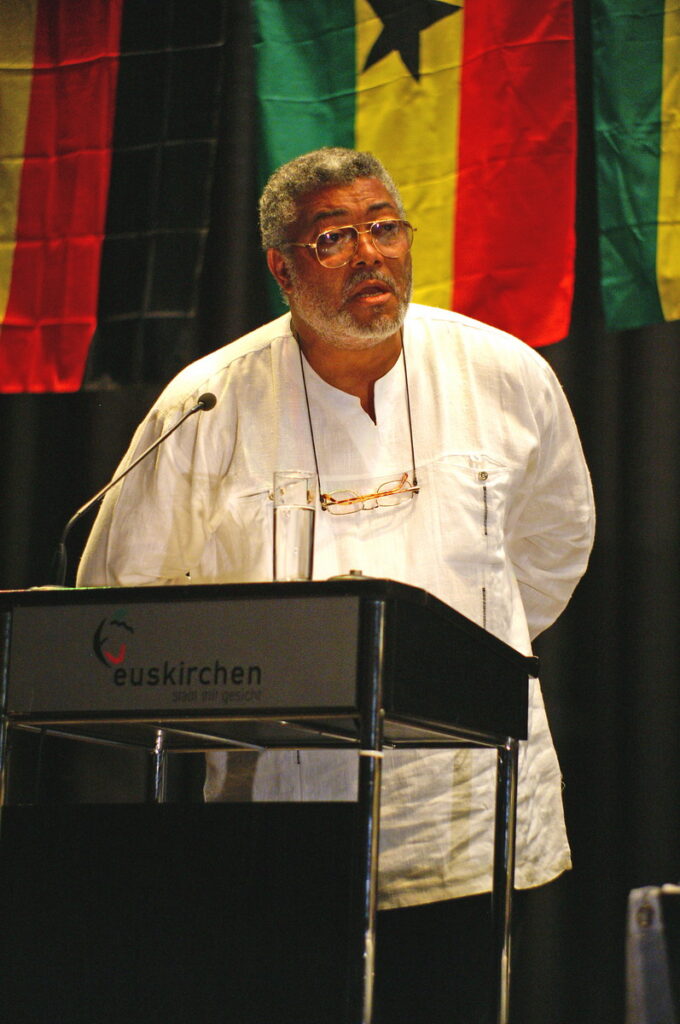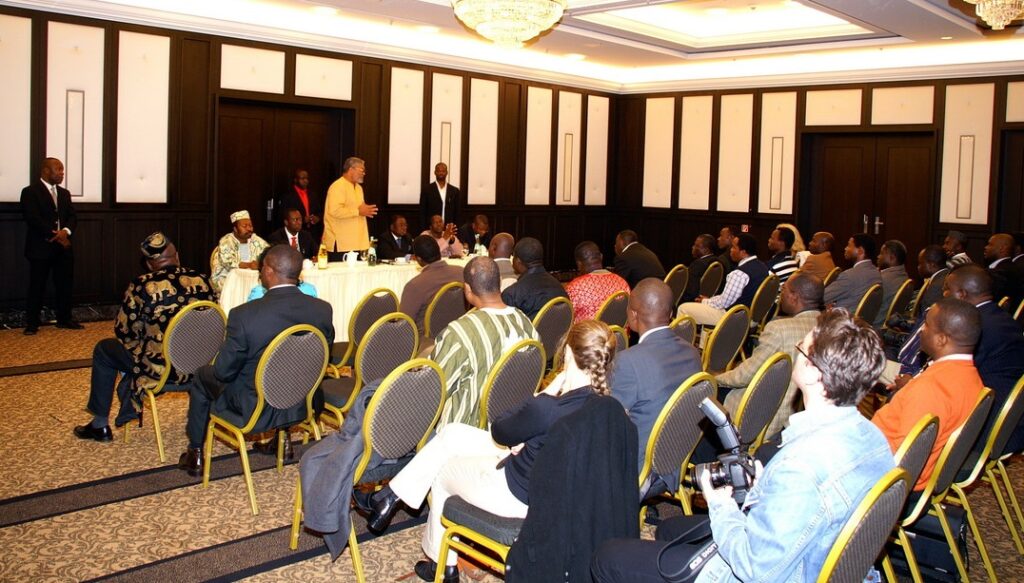Former President John Jerry Rawlings of Ghana was in Germany on 21 October 2006 to launch the African Forum, an organisation dedicated to the democratic transformation of the African continent. Rawlings, who ruled his country for 19 years, identified what he considered as the core problem facing Africa. We bring you back the report in memory of a great African leader who passed a year ago on 12 November 2020:
—–
President John Jerry Rawlings was speaking in Euskirchen, near Bonn, at the launching of Africa Forum, an organisation that offers an avenue to Africans in the Diaspora to ponder over the continent’s problems and offer solutions by availing their homelands of the “riches of their experience”, in the words of Rawlings.
The man who is credited with bringing about a new order in Ghana tasked Africans on their attitude towards each other. He cited the case of big men in Africa who visit their girlfriends after work and stay there sometimes till midnight, forgetting their driver in the car without bothering if he has eaten or not, or if he needed to go back to his own family. “Take a moment to think that women are still taken advantage of,” he challenged his audience. “These days, when women look for jobs, they must first sleep with the boss before they can be employed,” he lamented.
He also called on Africa to shun the culture of pompous protocol as it breeds mediocrity and sycophancy. “In Europe, only 25% of the time is dedicated to protocol. In Africa we expend 75% of the time, leaving only 25% for the real work,” he explained.

Corruption leads to revolt
Rawlings, who is the founder of Ghana’s main opposition party, the National Democratic Congress (NDC), called on African leaders to establish a relationship of integrity with their people. Corruption, he said, leads to revolts, reminding his audience that it was the hopeless situation in Ghana that led him and fellow soldiers to lead a revolt against the country’s rulers of that time in 1979. The bloody coup, which saw the execution, by firing squad of all past military rulers, was the result of corrupt leadership, he said. He called the death of the generals a sacrifice Ghana had to make in order to avoid a greater bloodshed that would have been visited on the civil population by disgruntled soldiers.
Avoid tribalism
Rawlings also hit at tribalism as a hinderer of African development. He singled out the case of Togo where the army is overwhelmingly staffed by members of President Faure Gnassingbe’s Kabye ethnic group. “About 80 % of soldiers are from one ethnic group,” he revealed. That situation, he explained, enabled former President Gnassingbe Eyadema to rule his country for 38 years and after his death made it possible for his son to succeed him, “establishing a dynasty,” Rawlings said.
“Tribalism sows the seed of instability,” he remarked, narrating his experience in Ghana, where opposition to his rule was ethnicised, a situation that nearly led to the destruction of comradeship in the military.
Rawlings called on politicians and the elite to avoid tribalism in their competition for power.

Way out for Togo
He named as a precondition for the resolution of Togo’s political crisis, the “nationalisation” of the country’s military services. He also called on Europe to deal with the Togolese people with faith. He reminded his audience that Europe’s leaders hobnobbed with Eyadema during his rule, despite knowing the atrocities he was committing against his people. He also lambasted influential European countries for not putting enough pressure on the Togolese government during the controversial elections of last year, at which Faure Gnassingbe was elected.
To resolve the political crisis in Togo, Rawlings called for international support for President Faure Gnassingbe to enable him contain those still in charge of what he described as “the killer machinery of the country’s army”. He praised President Blaise Compaore of Burkina Faso for his efforts on the crisis, leading to the recent agreement signed between the government and the opposition. He said peace was only possible in Togo, if free and fair elections were held.
Need for Western sincerity
Rawlings called for a relationship of integrity between Western countries and the Third World. He noted the decline of morality in international politics, saying that it bode ill for good governance all over the developing world.
“The decline in morality in international politics is multiplied five, ten folds in national politics,” he said.
He called on Europe to enter into mutually beneficial partnership with Africa, “not the present one-sided relationship.” Africans don’t want to be economic or political refugees, he said, alluding to the thousands of Africans trying to reach Europe on boats. He also urged Africans to question their leaders, as complacency is only beneficial to dictatorship and corrupt governance.
Multinationals abet corruption
The former president also blamed multinationals for colluding with corrupt African rulers to rob African countries. “Multinationals thrive on corruption in the Third World,” he said. He revealed from his own experience that honest and transparent African leaders are sabotaged by the combined action of Western media, intelligence services and multinationals. He described how he faced relentless threat of subversion during his time in office because of his transparent policy. “This triumvirate acts as a layer between African leaders and their people,” he declared.
The event, which was organised by the African Group for Development, comprising the NDC German Chapter and the Togolese opposition group Front de Libération des Peuples Africains (FLPA) -Togo, was attended by participants from across Europe.
Among those who accompanied former President Rawlings to the occasion, which took place on 21 October, were Mr Alban Bagbin, the Minority Leader in Ghana’s parliament, Mr Victor Gbeho, former foreign minister and special adviser to Rawlings, and Mr Gershon Gbediame, MP for Nkwanta South.
Femi Awoniyi
Report published originally in the December/January 2006/7 edition of The African Courier magazine
 THE AFRICAN COURIER. Reporting Africa and its Diaspora! The African Courier is an international magazine published in Germany to report on Africa and the Diaspora African experience. The first issue of the bimonthly magazine appeared on the newsstands on 15 February 1998. The African Courier is a communication forum for European-African political, economic and cultural exchanges, and a voice for Africa in Europe.
THE AFRICAN COURIER. Reporting Africa and its Diaspora! The African Courier is an international magazine published in Germany to report on Africa and the Diaspora African experience. The first issue of the bimonthly magazine appeared on the newsstands on 15 February 1998. The African Courier is a communication forum for European-African political, economic and cultural exchanges, and a voice for Africa in Europe.




























